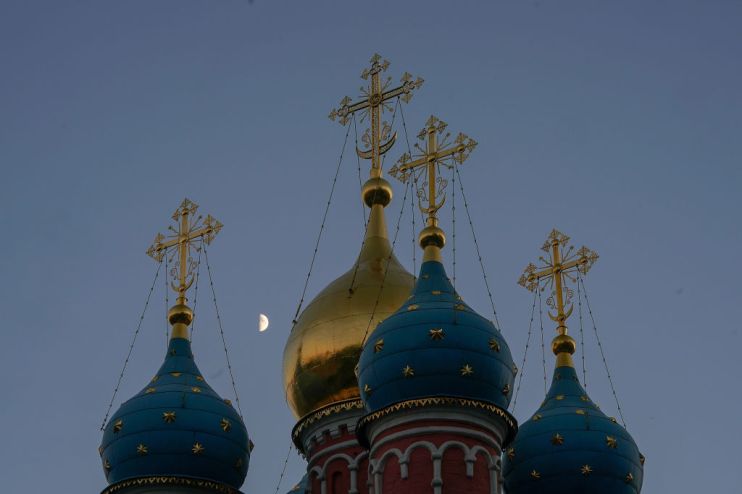Swift backlash: Will Russia snake past Western sanctions?

Sanctions are intended to choke economies for decades. This week could a sign that Russia is heading for the mire.
The intended effects of Western sanctions are already materialising.
This week, the rouble, Russia’s currency, collapsed around 40 per cent.
The Moscow Stock Exchange has been shuttered since Monday.
Concern about Russia being effectively frozen out of the global economy has sparked bank runs across the country.
However, for all the praise heaped on the UK, EU and US for swift action, their efforts could amount to nothing if Russia snakes past the roadblocks laid in front of them.
Swift expulsion
Expulsion from Swift has long been characterised as a heavy hitting sanction, and has prompted Russia to ready its financial defences.
Russia’s central bank rolled out its alternative Financial Message Transfer System (SPFS) in 2014, and the system has already been used by Russian banks to communicate with each other.
It currently boasts around 400 users made up of Russian lenders, with a smattering of Belarussian and Armenian firms who were admitted last year.
This is of course dwarfed in both quantity and reach by Swift, which has 11,000 financial institutions signed up across 200 countries and handles around $5 trillion in transactions per day – around $1.25 quadrillion dollars a year.
Payments systems existed before Swift. Banks used fax machines and telex tools to conduct transactions.
But, Swift enables lenders to move money faster and at lower cost. The banking sector is able to rapidly adapt its operations to maintain the flow of capital throughout the financial system, exhibited during the pandemic.
The intention of booting Russian banks out of Swift is to lock Russia out of global capital markets, making it more expensive for the country’s businesses, banks and central bank to borrow money.
The curbs will also shrink the number of investors willing and able to invest in Russian debt, making it harder for borrowers to find lenders.
Experts have said the Swift expulsion may result in SFPS pulling further breakaway states, or compel Russia to develop a new system altogether.
Charles Delingpole, Founder and CEO of regtech firm Comply Advantage said: “In the longer term forcing Russia out of SWIFT could see a competing payments system develop to link China, Venezuela, Iran and other allied countries, adding to the financial balkanisation of the global economy.”
“The most likely implication of [kicking Russia out of Swift] is the sharp reduction in the number of financial transactions, without removing them all together,” analysts at Goldman Sachs said.
Consumer trouble
For consumers too, Russia’s financial exile will have profound implications, but ones that Russia is ready to withstand.
Visa and Mastercard announced this week they would shut down access to their networks for sanctioned Russian banks, but the two payments giants gave Russia a taste of the payments freeze in 2014 when they blocked a number of lenders.
The sanctions prompted the Central Bank of Russia to roll out its Mir card payments system in response, which Russia’s biggest bank Sberbank began issuing cards with in 2016.
According to Russia’s Central Bank, the card accounts for 25 per cent of all card transactions in Russia and 32.3 per cent of new card issuance.
If Mir is to fill Visa and Mastercard’s role, which make up around 90 per cent of payments outside China, it has some serious ground to make up.
Retaliatory strikes from Moscow
The biggest threat to Western economies resulting from spillover effects from the package of sanctions is not disruption to the financial system, but Moscow squeezing energy flows to Europe.
The Kremlin may impose restrictions on Russian energy giants’ trading with the West, which could “prove potentially more damaging for the European economy than the direct risk of financial disintegration due to the sanctions,” Goldman said.
Europe relies heavily on Moscow for gas supplies, with the bloc’s economic powerhouse, Germany, sucking in around 40 per cent of its gas inventories from Russia.
A scarcity of energy will curb activity in Europe’s industrial sector and raise costs for most businesses.
Although Britain is less reliant on Russia for energy supplies, oil and gas prices are set in European markets, meaning the cost of securing inventories will likely climb.
Investors brace for losses
Holders of Russian assets are facing the prospect of booking losses due to Russia responding to being frozen out of Swift with placing strict curbs on capital flows out of the country.
Funds invested in Russian assets have already frozen investor redemptions in a bid to minimize losses.
The Pitctet Russian Equities fund has lost around £300m, while BlackRock’s BGF Emerging Europe fund has suffered similar losses.
Sanctions are intended to choke economies for decades. If this week is anything to go by, Russia is heading for the mire.